Wrong Turn (2003): The Representation of Gender and Class
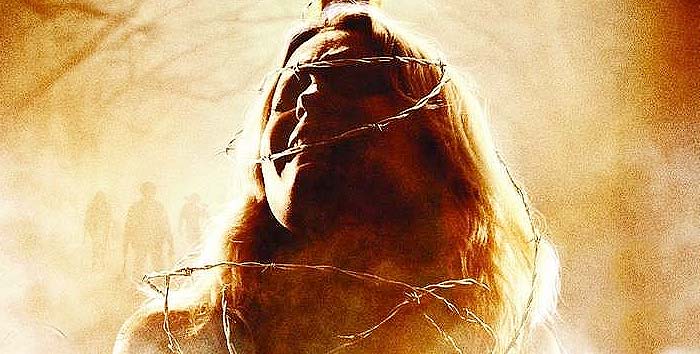
“Don’t go into the woods” is perhaps one of the oldest warnings in horror cinema. With origins in traditional fairy tales, the notion of wandering from the village to the deep, dark forest becomes, in modern horror cinema, driving from the city to take a vacation in the country. In any iteration, the message is blatant: the country and its peoples are dangerous. And when I say that these films depict people from the country as dangerous, I mean that they are usually inbred cannibals, a hyperbolised image of how American people from the city view their Southern neighbours: degenerate rednecks made so backwards by the backwoods and so beyond the civil limits of the law that they violate not one but two of Western culture’s most heinous taboos.
Much has been said in horror film criticism about redneck/cannibal cinema’s operation of a class-divide narrative. Speaking about Tobe Hooper’s The Texas Chainsaw Massacre, which heavily draws on this genre’s narrative, Robin Wood poses that “the family, after all, only carries to its logical conclusion the basic (though unstated) tenant of capitalism: that people have the right to live off other people”. Carol Clover in ‘Men, Women and Chainsaws’ has extended this idea to a gendered analysis of the city/country divide, where city men are almost always feminized and country men are conspicuously masculine in contrast. The argument I wish to present today is an extension of Clover’s findings to account for the interaction between gender and class in Rob Schmidt’s backwoods horror film, Wrong Turn.
Cannibalism in Wrong Turn is a metaphor for consumerism and gender. The film is concerned with, as its title suggests, all kinds of wrong turns: the wrong turn from city to country but, also, the idea that these city men and women have wrongly turned against their biological nature – literally, have gone against the grain. Hence, Wrong Turn is a deeply essentialist narrative that insists its characters go back to where they came from, back to an almost Darwinian, hunter-gatherer notion of gender roles. In relation to the cannibalism motif, it seems that in order to avoid going back to where they came from, i.e. inside another person’s stomach, the city-people have to, ironically, go back to where they came from. Wrong Turn posits that their survival depends on reverting back, making a right turn in the film’s language, to a ‘survival of the fittest’ paradigm. This paradigm specifies that men are men, women are women, and never the two paths shall meet.
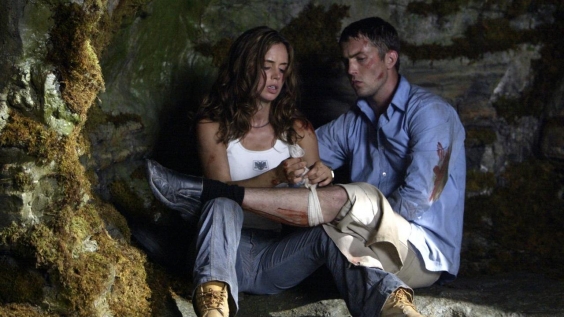
Firstly, Wrong Turn and the backwoods horror sub-genre more widely have their roots in the American Gothic tradition. Horror cinema saw an influx of redneck cannibal films in the 1970s with Deliverance, The Hills Have Eyes, and The Texas Chain Saw Massacre being the most famous examples. This genre saw a resurgence in the early 2000s, with a remake of Texas Chainsaw in the same year that Wrong Turn was released and a remake of Hills Have Eyes following three years later. Despite this trend, very little has been written about about Wrong Turn. Such texts are characterised by a certain aesthetic more than certain ideas, and the most significant of these images are the wilderness and the family unit home. Most significantly a feeling of the uncanny is the central device in American Gothic literature where the genre presents us with things we ought to be familiar or comfortable with (nature, the home, and the family) and turns it on its head – and I would pose that this notion of inversion is quite important to a film titled Wrong Turn.
For the figure of the redneck or hillbilly is in fact an inversion of where we came from; at a cellular level, as Wrong Turn’s opening credits which show the Mountain Men’s DNA mutating foreshadow, there has been a genetic mutation of the pioneer ideal. Positive traits like the pioneer spirit, strong family networks governed by benevolent patriarchs, clearly defined gender roles, and closeness to nature becomes social and economic backwardness, inbreeding, cannibalism, and savagery. It is for this reason that Carol Clover identifies such characters as the economic or rural Other. Hence, there is always a secret dread that perhaps the image that these figures confront us with isn’t as far removed from ourselves as we would like; rather, they are simply a mutated version of what we have been told is ideal America, a version that has taken a very wrong turn.
From this generic context alone, it is not difficult to see why criticism about backwoods horror tends to focus on class. Clover builds on this analysis by pointing out that “equally central and equally brutal [is] the confrontation, cast in almost Darwinian terms, of the civilized with the primitive. Could ‘we’ do what is to be done under such conditions? Or have city people refined themselves out of the Darwinian game?” and I would pose that this point opens up possibilities for an analysis into gender relations in Wrong Turn.
The film is about Chris Flynn, a medical student passing through Greenbrier County on the way to a job interview, when he crashes into the back of a car, occupied by Jessie, Carly, Scott, Francine, and Evan, five friends who have taken Jessie out for a camping trip after she was dumped by her boyfriend. In regards to Chris, Scot, and Evan they match perfectly with Clover’s description of city men as appearance-concerned, trinket-laden, physically weak and incompetent, queasy about the hard facts of rural life (animal slaughter), and even given to tears. For instance, Chris is told by a local truck driver to “get back in [his] truck and fix his hair a couple of hundred more times”. Scott wears a necklace made out of a flower given to him by Carly. Evan is a stoner. Finally, Chris’ sheer surprise at a dead deer in the middle of the road (despite his medical training) causes the all-important car accident.
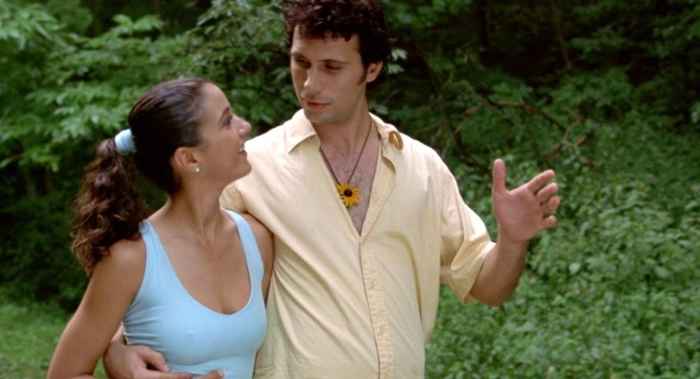
Where the film’s male characters are portrayed as quite feminine, the film’s female characters are depicted as equally masculine. On this point, Clover makes no comment; unfortunately we take masculine female leads in horror for granted (this is what the Final Girl trope is) and we still have a ways to go with representing positive versions of feminine men because, usually in horror, where men are feminized, they will cause trouble (we can thank Psycho for this phenomenon). To illustrate, while the others go off in search of a phone, Francine very assuredly initiates a quickie with Evan (while imitating a stereotypical Southern accent, I might add). The best way to describe Carly, who is often called ‘Carl’, is that she wears the pants in her relationship with Scott, quite literally in regards to her costume. Carly also initiates a ‘false scare’ moment, a trope that is usually confined to male characters in horror cinema, at least when they are knowingly pranking someone. Finally, Jessie is our archetypal, masculine, androgynously-named Final Girl, cemented by the casting of Eliza Dushku. One reviewer of Wrong Turn actually commented that “whoever decided to cast Dushku, who radiates ferocity in every one of her performances, as a damsel in distress ought to have their head examined”. I agree, but would posit that our intertexual memory of Dushku as a woman of action aids in emphasising the film’s logic about gender and people from the city.
Clover goes on to say that country men by contrast are conspicuously masculine. What is more, Wrong Turn’s aptly named Mountain Men are an all-male family, which is not uncommon in redneck cannibal films (think of the Sawyer family in Texas Chainsaw). This is an image of male authority and comradery gone awry to the extent that, in a Freudian reading, cannibalism as a kind of fantasy of rebirth eliminates the need for any kind of mother figure. Rural Gothic narratives are often predicated upon ill-fated encounters between people who are economically confined to one place, the country, and those from the city who have the means to ‘just pass through’ – so the narrative formula presents a metaphor for gender essentialism versus gender fluidity and the way in which each is influenced by one’s economic status.
But I would like to return to cannibalism/consumption as a metaphor for capitalism and what this may have to do with gender roles. The film presents the Mountain Men and the city people equally as consumers. For example, Chris comments that he put all of his money into his car, and in one sequence Evan is complaining that Scott and Carly took all his stuff, like sunscreen, bug spray, and says “they took all my power bars”. Evan’s dialogue shows an ironic contrast between the kinds of things eaten by men from the city and men from the country; where city men can only compartmentalise, package, and sell ‘power’ into something processed and bite-sized, the country men hold all the power in that they can actually take life away (and literally consume power).
So, both groups are consumers. But the film poses that where the Mountain Men are consumer-hunters, cemented by their use of weaponry such as bear traps, barbed wire, a bow and arrow, knives, and axes, the city men have become consumer-gatherers and this is where the wrong turn has been taken in the film’s very Darwinian logic. So cannibalism becomes the film’s way of asserting the ultimate form of male mastery in the essentialist figure of the hunter. By pitting the two groups against each other with no recourse to the law or one’s class comforts such as a phone, Wrong Turn asks whether city men are up to the challenge of going back to where they came from; can they survive in a purely muscle-on-muscle situation or, as Clover asked, have they refined themselves out of their hunter roles?
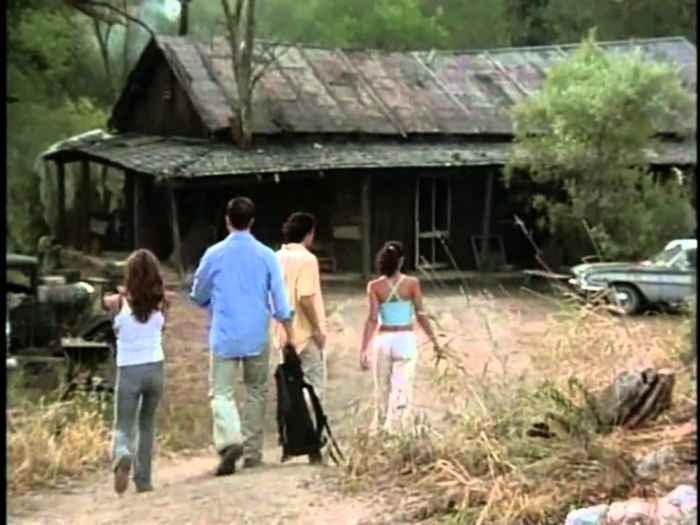
Let’s find out. There are two major sequences where the city group attempts to push back against the country group that are now trying to kill them and whether their plans are successful or not is quite telling in regards to where the film’s gender politics lie.
The first is the plan to, as Scott says, “lead them in the wrong direction”: one person will distract the Mountain Men while the rest of the group commandeer their truck. But the city group’s attempt at their own wrong turn is foiled by the role reversal that was already in place – they assume the wrong position for their respective gender role. Chris immediately volunteers to be prey/bait and gets shot in the leg. Then Scott rushes out and assumes the role of bait which leaves Jessie and Carly to take the truck. They pick up Chris and attempt to double back and find Scott, but he is shot through the chest with an arrow. And then, if the film had not already made its point clear, the group drives away – with Jessie driving the truck while Chris comforts Carly. Jessie is literally in the driver’s seat while Chris does the more emotional work of taking care of Carly, a rarity in cinema of any genre. But then, of course, in accordance with the film’s essentialist logic that can’t abide by this image, nature eventually catches up to the three, the truck gets stuck in the mud, and the group’s attempt at a wrong turn has left them worse off than when they started.
The second plan actually works out for the group in a way and it is very much framed as a turning point in the narrative. Chris, Jessie, and Carly stumble upon a watchtower and attempt to call for help with a radio they find there. Unfortunately, the Mountain Men find them first and set the tower on fire. Carly says “I’d rather jump than burn to death” which is exactly what the plan becomes – they jump from the tower into the trees and a cat-and-mouse chase ensues. Unfortunately, Carly is killed and as her body falls from the trees, the film very insidiously grants her to wish to die by falling than by fire. So, Chris and Jessie are left and they decide that they have to knock the Mountain Men out of the trees. Chris draws back a heavy branch, waits for Jessie to hold on, and then gets up to again draw the Mountain Men towards them by acting as prey. But at the last second, they switch because of Chris’ injured leg, and now we have Jessie as the, in that reviewer’s words, the classic ‘damsel in distress’ and Chris in command of the long, hard tree branch (read: phallus). And the plan works! They manage to knock the Mountain Men out of the trees, which gives them enough time to get away and they spend the night in a small cave, out of sight and safely hidden from the passing Mountain Men by a waterfall. So, nature grants Chris and Jessie protection now that they are harmoniously conforming to their ‘biological nature’, so much so that as editing transitions us from nighttime to day time, the audience understands that the two slept undisturbed through the entire night – a rarity in horror cinema.
So, what did our Final Girl and leading man learn from this experience? The film’s ending would suggest…nothing. Up until this point, the city group’s plans to escape have all involved some kind of gathering: they decide they need a car to get out, and then they need a radio to call for help. But when Jessie is captured by the Mountain Men, Chris is left with only the option to hunt – to fight back, to kill them and end the nightmare once and for all.
And so the film’s ending is one long fight sequence, but I would like to point out that most of the fighting is done by Jessie, or at least the film focuses its time on her. Notably, at one point, one of the Mountain Men has Chris cornered and Jessie manages to undo her restrains, retrieve a bow and arrow, and shoot the Mountain Men in the back of the neck. Not only does Jessie save herself, she saves Chris also. Jessie also retrieves an axe and takes down another of the Mountain Men and, at this point, it seems as if she will have single-handedly defeated the family. But, as the film’s opening credits warned us, the Mountain Men have genetically mutated so that they are impervious to pain and have a kind of super strength. Arrows and axes and all, they get right back up again and in a final cementing of Wrong Turn’s essentialist logic, the phallus has failed in Jessie’s hands; and as she attempts a final blow to one of the Mountain Men with a plank of wood, the phallus literally shatters, broken in two.
It is Chris who saves the day by taking up a shotgun and shooting the gas tank of a nearby car, which blows up the Mountain Men and their home in spectacular excess and celebration of phallic, masculine triumph in the correct hands. It seems as if our city people have finally learned to go back to where they came from, but Wrong Turn actually ends with Jessie driving her and Chris out of the woods – which brings me to my point about what these characters actually learned, or rather did not learn.
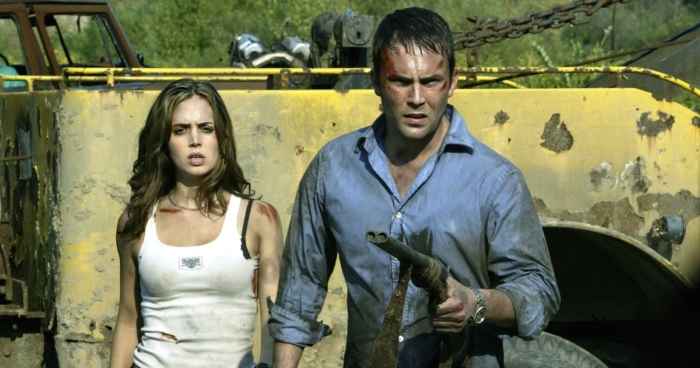
There is a very brief credits scene before Wrong Turn’s epilogue: a policeman arrives at the remains of the Mountain Men’s home and, like a phoenix from the ashes, more red now than ever before, one of the Mountain Men emerges and attacks the policeman. It is as if the shot of Jessie driving away triggers something in the text. One wrong turn deserves another, and another, and another, and now in 2019 a seventh film is currently in production. Seven films later and I would question what change Jessie and Chris actually brought about; in fact, in the second film, the family have only increased in numbers. This final wrong turn has indeed lead to consequences, has led to a literal dead end (which, incidentally, is the title of the second film in the series).
To conclude, Wrong Turn definitely is not suggesting that we become like the Mountain Men. In fact, unlike most redneck cannibal horror films, it is abundantly clear that the city-people are the victims and the country-people are the perpetrators. Wrong Turn’s concern with role reversal instead presents a portrait of survival in post-9/11 America where businessmen can only achieve their titular deliverance once their essential gendered strengthens have been tested in the crucible of nature. Survival concerns us all, whether we are from city or country. And the Mountain Men have figured out what they need to do to survive; the question remains as to whether Chris and Jessie have done the same.
If we are to survive in this almost apocalyptic version of America the film posits, then we have to go back to where we came from; thus Wrong Turn is complicit in re-framing the past, in this case the very distant past, as a conservative haven. The implications for feminist theories of gender roles in particular is a sinister reminder that if we can progress and put women in a man’s position, if we can move forwards, we can also move backwards; all that is needed for a role to be reversed is another reversal, another wrong turn. Overall, Wrong Turn does not expose the limitations of sex role theory so much as it creates a loophole in the form of a crossroads for the biological essentialist agenda.
Works Cited
Alter, Ethan. “WRONG TURN (Film).” Film Journal International, vol. 106, no. 7, July 2003, p. 45.
Clover, Carol J. Men, Women, and Chainsaws: Gender in the Modern Horror Film. B.F.I. Publishing, 1992.
Wood, Robin. “An Introduction to the American Horror Film.” Movies and Methods. Ed Bill Nichols, vol. 2, California U.P, 1985, pp. 195-220.
What do you think? Leave a comment.










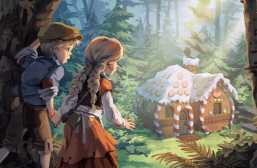
I remember liking this movie. I thought that it was especially good for not adding any random/ sometimes unnecessary nudity scenes.
West Virginia is a beautiful state. It’s always portrayed in the movies as a slag heap populated by degenerates but not so. It’s called the Mountain State and so it is and the people – there aren’t many of them. Biggest city is only 50,000.
Tell that to the people living in the Global South.
Watched this recently. I love the strong female character of Jessie. Eliza Dushku is absolutely amazing in this film, and I don’t think I’ve ever been as struck with awe as I have watching her character get stronger and stronger as she goes on throughout the film. Her performance was absolutely stunning. She’s definitely an actress I enjoyed seeing on screen, and I will definitely be looking at more of her films in the future.
Here’s a hint to the characters: if you go into a shack in the middle of dense woods and you find a ton of keys to BMW’s get out now.
I watched the special features and I enjoyed the segment were Eliza Dushku talked about learning and doing her own “stunts”.
One of my fav horror movie I’ve seen this about a hundred times!
Just watched it after reading your analysis. The film was a lot more suspensful and scary than I initially thought. The cannibalistc creatures that are hunting down the characters are scary as hell.
I saw it when I was 12 years years and I couldn’t sleep. It was really a good experience to watch it.
One thing I really enjoyed from this film, was the fact that although it was the overdone trope of inbred hillbillies, the make up for them was done quite well. It showed them as human, twisted and evil, but human, and that’s something not often done in the trope.
Just seen this for the second time since it came out long ago, and its still a pretty decent horror movie. It doesn’t break the mold but still awesome.
I don’t know about you, but from my perspective, there’s something vaguely regressive and sinister about the notion that city and country people “just are” one thing or another. I know that in real life, for instance, it’s absolutely not the case that women in rural areas are always subservient or invisible, or that city men are always weak. Does the movie do anything to subvert or challenge the idea that all people who live in the countryside are inbred cannibals, or that people from the city are useless in the great outdoors unless they regress to a primitive “savage” state?
I can’t say this is the sort of film that would lure me into the cinema, but having said that, your article kept me reading to the end. Very good analysis and an absorbing read. Thank you.
I liked the leading man, stern and authoritative throughout, never backing down, never losing his resolve.
at first i thought that this was going to be a typical stalker film,, plsycho in the woods after a bunch of oversexed teens,, i was happy to see that it was not the case
Great entertaining backwoods slasher.
This movie is a buzz kill. It relies on sudden loud music and sound to scare you. After the second time it’s freakin’ annoying.
Great analysis of this classic. I liked the scene where the sole survivors were hiding in a watchtower and were trying to communicate with the police.
It is interesting how nature, as a setting and thematic concept, is cast in horror movies. In “Wrong Turn,” it appears to be, on the surface, an “other” place, one that’s foreign and hostile to the urban dwellers. Certainly the homicidal hillbillies reinforce it.
However, you make a point that, even if the hillbillies are the malicious antagonists of the movie, the basic tenants of a “return to nature” (including a traditionalist view on masculinity and power, for example) are primary for the story’s thesis (so to speak).
Having done some reading on Poe and romanticism, much of the American arts has cast nature, a place separate from industrialization, as the bastion of true intellectual actualization. As such, traditional gender roles and living “simply” are often lionized, and innovation and change are looked at disdainfully. Poe, perhaps the most important horror author in America, has somewhat a hand in forwarding that outlook, so much of horror (especially American horror) tends to forward that Romantic notion.
But I digress. I appreciate your article, for finding insight in a genre of film that is often dismissed south of hand by critics and academics (at least in the past). Kudos!
I think this was exactly the kind of movie that inspired Tucker and Dale vs Evil!
It’s 2019 and this movie is still by far one of the scariest movies of all times. Def. Makes you think about incest and how disgusting it is!
One very annoying thing about is the reliance on poor CGI effects in scenes you wouldn’t expect to see them.
I never managed to watch Wrong Turn until recently. I have always been a fan of Eliza Dushku, but for one reason or another, I just kept putting off watching this one. Turns out, I made a wise decision.
Although I like the second and third better, this certainly was more scary, suspenseful and creepy. This is the only movie that gave me actual nightmares about the mutants.
I remember Wrong Turn as it inspired a large number of substandard hollow sequels. I consider Joy Ride to be another series where the later instalments were similarly trying to just emulate the original.
Hated it then, hate it now
Hillbilly horror is definitely a genre worth exploring a bit more for the classist origins, you said it has roots in American Gothic horror and I suppose that’s true but aren’t better connections?